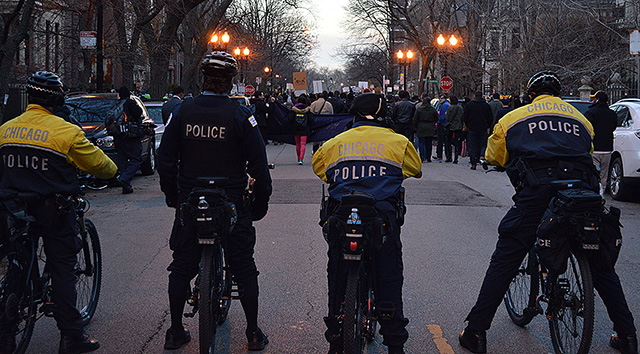DOJ Says 'Deficient' Chicago Police Accountability Fuels Unconstitutional Misconduct
By Stephen Gossett in News on Jan 13, 2017 8:19PM

By Aaron Cynic/Chicagoist
One of the preeminent findings in the Department of Justice's exhaustive, 13-month investigation into the Chicago Police Department is a failure of police accountability.
For those who've watched as the toothless Office of Professional Standards morphed into the ineffectual Independent Police Review Authority, which will in turn give way to the city's latest oversight agency, the Civilian Office of Police Accountability (COPA), the conclusion will not register as a shockwave. But its formalization is significant, and likely necessary if the cycle is to break. And the breadth of "deficient" accountability outlined is noteworthy.
The investigation determined:
• The city fails to investigate the majority of cases it is required to investigate by law.
• When it does investigate, the questioning of officers is aimed at eliciting information favorable to the officer, and investigators do not confront officers with inconsistent physical evidence.
• The city does not take sufficient steps to secure accurate and complete witness statements, including by preventing officers from concealing misconduct.
• Discipline is haphazard, unpredictable and does not deter misconduct.
The city had a dismal record of prosecuting misconduct in the timeframe prior to the probe, it notes. "The City received over 30,000 complaints of police misconduct during the five years preceding our investigation, but fewer than 2 percent were sustained, resulting in no discipline in 98 percent of these complaints," the report states. "This is a low sustained rate," it adds, caustically. In that same timeframe, 409 investigated police shootings yielded only two conclusions of unjustified use of force.
Sustained problems that feed the negative situation are "a formal [city] policy against investigating many complaints about force; referral of verbal abuse complaints to a process in which no discipline can be imposed even if misconduct occurred; a failure to investigate anonymous complaints or complaints without a sworn affidavit; and handling many complaints via a so-called “mediation” process that is in fact antithetical to the tenets and goals of complaint mediation."
"Collectively, through this patchwork of policies and practices, the City fails to conduct any meaningful investigation of nearly half of the complaints made against officers." (Emphasis ours.)
Significantly, the report points a finger at the city's contract with the police union, specifically the controversial, chilling-effect provision that mandates a sworn affidavit be made before an investigation proceeds. The rule "creates a tremendous disincentive" for complainants, the report states.
When the police department is involved oversight, in cases that fall outside the city body's purview, their investigations are neither "complete nor fair:"
"Our review of investigative procedures, interviews of current and former investigative personnel, and careful analysis of 400 IPRA and BIA investigations revealed a consistent unwillingness to probe or challenge officers’ accounts of the incident, even when these accounts were inconsistent with physical evidence, credible eyewitness statements, or common sense."
Another red flag, in city-level police investigations, is an undermanned staff at the IPRA. Despite the agency being phased out, the point is not moot. Its replacement's "range of responsibilities will also be much broader than IPRA’s," the report notes. However, "there has not been sufficient analysis to determine whether COPA will have the capacity to do any better than IPRA. The City should be mindful of the concerns discussed below and ensure that it provides resources to COPA adequate for it to succeed." As with so much of the DOJ's findings and recommendations, funding will remain key.
The report also states conclusively that a "code of silence" in the Chicago Police Department is real. The DOJ elaborates:
"We cannot determine the exact contours of this culture of covering up misconduct, nor do we know its precise impact on specific cases. What is clear from our investigation, however, is that a code of silence exists, and officers and community members know it. This code is apparently strong enough to incite officers to lie even when they have little to lose by telling the truth."
Again, the existence of a code of silence shouldn't be shocking. The head of the Chicago Police Union has acknowledged—and defended—as much. But the Department of Justice's formal recognition of that fact, along with myriad other outlined "deficiencies", could be a watershed. As the city and Justice Department navigate its agreement in principle through the consent-decree stages, we'll see whether or not that bears out.